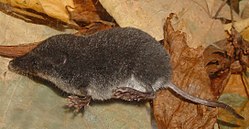尖鼠
Chinese
point (of needle); sharp; shrewd point (of needle); sharp; shrewd; pointed |
rat; mouse | ||
|---|---|---|---|
| trad. (尖鼠) | 尖 | 鼠 | |
| simp. #(尖鼠) | 尖 | 鼠 | |
Pronunciation
- Mandarin
- Cantonese (Jyutping): zim1 syu2
- Southern Min (Hokkien, POJ): chiam-chhí / chiam-chhú
- Mandarin
- (Standard Chinese)+
- Hanyu Pinyin:
- Zhuyin: ㄐㄧㄢ ㄕㄨˇ
- Tongyong Pinyin: jianshǔ
- Wade–Giles: chien1-shu3
- Yale: jyān-shǔ
- Gwoyeu Romatzyh: jianshuu
- Palladius: цзяньшу (czjanʹšu)
- Sinological IPA (key): /t͡ɕi̯ɛn⁵⁵ ʂu²¹⁴⁻²¹⁽⁴⁾/
- (Standard Chinese, erhua-ed)+
- Hanyu Pinyin:
- Zhuyin: ㄐㄧㄢ ㄕㄨˇㄦ
- Tongyong Pinyin: jianshǔr
- Wade–Giles: chien1-shu3-ʼrh
- Yale: jyān-shǔr
- Gwoyeu Romatzyh: jianshuul
- Palladius: цзяньшур (czjanʹšur)
- Sinological IPA (key): /t͡ɕi̯ɛn⁵⁵ ʂuɻʷ²¹⁴⁻²¹⁽⁴⁾/
- (Standard Chinese)+
- Cantonese
- (Standard Cantonese, Guangzhou–Hong Kong)+
- Jyutping: zim1 syu2
- Yale: jīm syú
- Cantonese Pinyin: dzim1 sy2
- Guangdong Romanization: jim1 xu2
- Sinological IPA (key): /t͡siːm⁵⁵ syː³⁵/
- (Standard Cantonese, Guangzhou–Hong Kong)+
- Southern Min
- (Hokkien)
- Pe̍h-ōe-jī: chiam-chhí / chiam-chhú
- Tâi-lô: tsiam-tshí / tsiam-tshú
- Phofsit Daibuun: ciamchie, ciamzhuo
- IPA (Xiamen): /t͡siam⁴⁴⁻²² t͡sʰi⁵³/, /t͡siam⁴⁴⁻²² t͡sʰu⁵³/
- IPA (Quanzhou): /t͡siam³³ t͡sʰi⁵⁵⁴/, /t͡siam³³ t͡sʰu⁵⁵⁴/
- IPA (Zhangzhou): /t͡siam⁴⁴⁻²² t͡sʰi⁵³/, /t͡siam⁴⁴⁻²² t͡sʰu⁵³/
- IPA (Taipei): /t͡siam⁴⁴⁻³³ t͡sʰi⁵³/, /t͡siam⁴⁴⁻³³ t͡sʰu⁵³/
- IPA (Kaohsiung): /t͡siam⁴⁴⁻³³ t͡sʰi⁴¹/, /t͡siam⁴⁴⁻³³ t͡sʰu⁴¹/
- (Hokkien)
Noun
(deprecated template usage) 尖鼠
Japanese

| Kanji in this term | |
|---|---|
| 尖 | 鼠 |
| とが(り) Jinmeiyō |
ねずみ Hyōgai |
| kun'yomi | |
Etymology
Compound of 尖り (togari, the 連用形 (ren'yōkei, “continuative or stem form”) of verb 尖る togaru, “to be pointy or sharp”) + 鼠 (nezumi, “mouse, rat”).[1]
Pronunciation
Lua error in Module:parameters at line 858: Parameter "yomi" is not used by this template.
Noun
尖鼠 or 尖鼠 • (togarinezumi)
- a shrew (mouselike animal)
Usage notes
- As with many terms that name organisms, this term is often spelled in katakana, especially in biological contexts (where katakana is customary), as トガリネズミ.
References
- ^ Shōgaku Tosho (1988) 国語大辞典(新装版) [Unabridged Dictionary of Japanese (Revised Edition)] (in Japanese), Tōkyō: Shogakukan, →ISBN
Korean
| Hanja in this term | |
|---|---|
| 尖 | 鼠 |
Noun
Categories:
- Chinese lemmas
- Mandarin lemmas
- Cantonese lemmas
- Hokkien lemmas
- Chinese nouns
- Mandarin nouns
- Cantonese nouns
- Hokkien nouns
- Chinese terms with IPA pronunciation
- Chinese terms spelled with 尖
- Chinese terms spelled with 鼠
- zh:Soricomorphs
- Japanese terms spelled with 尖 read as とが
- Japanese terms spelled with 鼠 read as ねずみ
- Japanese terms read with kun'yomi
- Japanese compound terms
- Japanese lemmas
- Japanese nouns
- Japanese terms spelled with jinmeiyō kanji
- Japanese terms spelled with hyōgai kanji
- Japanese terms with 2 kanji
- ja:Soricomorphs
- Korean lemmas
- Korean nouns
- Korean nouns in Han script
- Korean hanja forms
